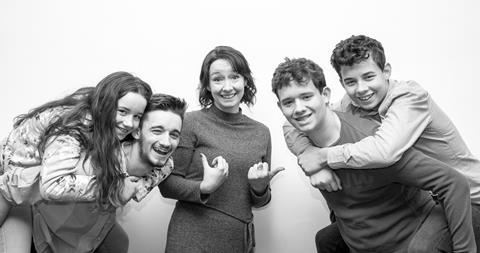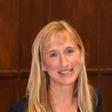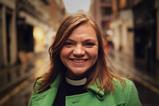Esther Scholes speaks candidly about how she navigated the deaths of her son and then husband

While still a child, Esther Scholes pledged that she would always say yes to God, to use her life to point people to him. When marriage, family, Bible college and church leadership followed, it seemed like she knew what he was expecting of her. Then her young son Daniel became sick and died, and just a year later her husband Richard was diagnosed with cancer and also passed away.
“I have fewer theories about the Christian life now,” Esther says. “About how if you do A, B and C, then D, E and F will follow. I would very much like to take the pen out of God’s hand and rewrite the story in what I think would be a much better way. But after the shock of my husband’s death, there was a phrase that came to mind: ‘He knows and he is good’.
“I don’t understand how this could have happened, but God has seen the plan and he is good so this is not a punishment. I need to trust him to bring good things from this.”
As a result, Esther shares her story whenever she’s invited to do so. Though no longer pastoring a church, a blog she wrote to keep family and friends updated during the family’s crises has reached a wide audience and she speaks to churches and groups all over the country.
“People want to hear my story, how we didn’t get a miracle and how we’re handling it now,” she says. “Even though a lot of days I don’t feel I want to speak about it, I don’t want the enemy to have any victory here.”
Esther’s faith is real and immediate, inspiring and liberating. She shares generously, with warmth and compassion.

Daniel’s death
The two losses affected Esther differently. She and her husband carried the burden of their son’s death together, and found meaning in what they went through but, when Richard died, Esther wrestled with the loss and the responsibility of raising her remaining four children alone.
Daniel was just six when he was rushed to hospital in 2010. Esther wasn’t worried initially, but the doctors couldn’t determine what was wrong with Daniel. He was unable to talk or walk and had seizures every day. A bone marrow transplant was successful but it didn’t resolve the condition and two-and-a-half years later, at the age of eight, Daniel died.
Goodness knows how many hundreds or thousands of people were praying and yet my son still passed away
“My husband and I supported each other,” she says. And they were encouraged by how they could share their faith with so many people, including hospital staff. “I remember thinking that it is so simple to just talk about who God is and what he’s doing in every single situation and circumstance.”
Even though prayers weren’t answered, she felt God’s hand on the situation. “Goodness knows how many hundreds or thousands of people were praying and yet my son still passed away. We were saying: ‘I don’t understand why stories happen like this, I don’t understand why we didn’t get the miracle. But if you can still use this to bring glory to you, you can still bring good out of this.’”
Wrestling over Richard’s death
The family celebrated Daniel’s life and went away on a few short breaks gifted to them by members of the church. They returned to the church renewed and determined to continue their mission to their community.
Then Richard was diagnosed with a rare cancer, also affecting the bone marrow but seemingly unrelated to Daniel’s condition. He was given five years to live.
Receiving the news, Esther felt that perhaps their experience would be different this time, that they would get a miracle so that they could show God’s power in their lives in a new way. Richard threw himself into preaching, working on a church building project and living life to the full. But a year later, in 2014, he passed away.
“With my husband’s illness there wasn’t that same sense of peace,” says Esther. “With Daniel we could make sense of it because we carried on building afterwards.
“With Daniel, and recently with my father’s death, I’ve been able to look at their lives and see a beautiful arc where God had been at work, using their lives and their deaths. But with Richard it felt there was so much potential and then it was cut off. It was such a shock.”
She admits to raging over his death. “I think there was a depth I hadn’t got to before. This raw, helpless state. The Psalms were a model, being brutally honest about emotions but pointing to God on the throne. And Job was the book I studied most because Job didn’t get the answers that he was looking for. I still wrestle with losing Richard.”
Making a move
For a few years afterwards she sought to continue the work she and Richard had started in their church in Morecambe. “But I got this strong sense that God was saying: ‘It’s time for your kids to be writing their own story. And you need to facilitate that.’”
After a year of agonising over the change of direction, Esther says: “It was as if God suddenly closed all the other doors and pointed in this direction.”
It was a move back to Preston, near to family, where Esther is currently a support worker with disabled people, acting as the National Prayer leader for the Free Methodist Church and training as a counsellor, as well as being mum to her four children who are now 20, 19, 15 and 12.
“Every week is different,” she says. “And this has actually been a very calm year for me, which I’ve enjoyed.
“A few years ago I was diagnosed with chronic fatigue. My energy levels were fluctuating such a lot. I used to be in leadership roles at the church, which were very task driven. Lately the rhythm of life has changed.
“I’ve become very precious about my time. Reading is always my ‘go to’ and I do a lot of walking. And I make sure I protect evenings with the kids when we just sit and chill together.”
She wanted her children to feel the same security in family and church as she had done growing up. “I’m one of four kids and we grew up in church. We were there twice on a Sunday, at all the youth stuff in the week and our social life always revolved around church. It was a really stable upbringing.”
Looking to God for the day ahead
Esther can see how her early life prepared her. “God had been training me for those crisis points through helping me to think deeply, to make studying the Bible a default. That’s what I’ve carried on doing.”
“Ephesians is possibly my favourite book,” she explains. “It feels alive when I read it so I try to find a way of making it look how it feels.” The pages of her Bible are full of the calligraphy and colour she has added and she keeps a notebook for her thoughts on her readings and prayers.
“One of the analogies I’ve used recently is to think of the beginning of your day as an empty page. There are many people around you giving you their opinions and, as soon as you access any kind of media, your phone, a screen, you are told ‘you need this to be happy’ or ‘have this to succeed’. During the day the page can be covered with those thoughts and expectations but not if you’ve already filled it with what you’ve heard from God and what you want the day to be like.”
Remembering the faith of others
Esther indicates that reading about other faithful women has helped her too: “Whenever I’ve been in a really bad situation, I tend to compare down rather than up,” she says, recalling the account of Corrie ten Boom’s life in a concentration camp.
“When Daniel was ill, people would say what had happened to me was ‘so awful’ but we weren’t in a concentration camp. I was in a hospital and had a comfy bed. It was warm and we were well looked after. There weren’t rats or guards beating us up.”
Esther read biographies of other women who had gone through challenging times. She remembered, too, her own grandmother widowed with six young children and running a farm. “I had these role models already,” says Esther. “So when the crisis came I thought: ‘I’m not the first to go through this. And what you do is stick by God.’”
Each time she tells her story, she hopes she will be helping someone in their point of crisis. “I’ve not been through divorce, I’ve not been through abuse or many things people have gone through but because I speak about pain, about wrestling with God, of not having easy answers, then people feel heard, feel seen and feel connected to God.”
If any of these issues have affected you, you can call Premier Lifeline for support. Premier Lifeline is a national, confidential helpline offering a listening ear, emotional and spiritual support from a Christian perspective. If you would like someone to talk with and pray for you, call Premier Lifeline on 0300 111 0101.































No comments yet